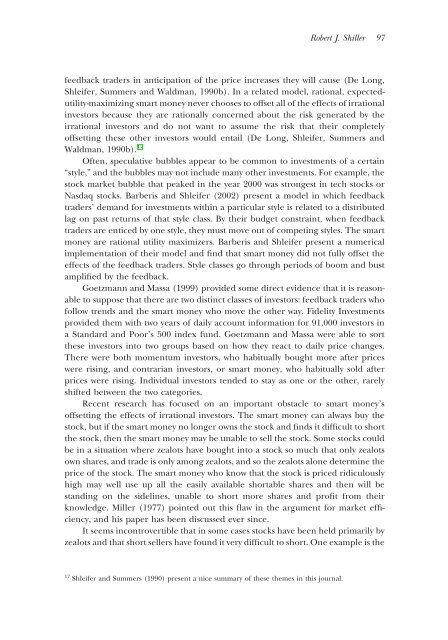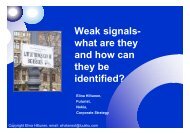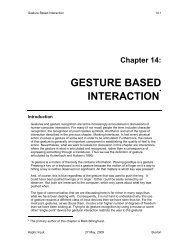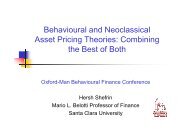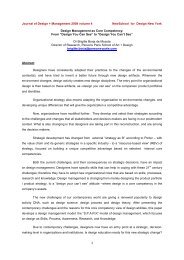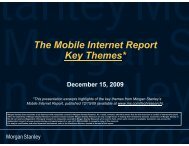From Efficient Markets Theory to Behavioral Finance
From Efficient Markets Theory to Behavioral Finance
From Efficient Markets Theory to Behavioral Finance
You also want an ePaper? Increase the reach of your titles
YUMPU automatically turns print PDFs into web optimized ePapers that Google loves.
Robert J. Shiller 97<br />
feedback traders in anticipation of the price increases they will cause (De Long,<br />
Shleifer, Summers and Waldman, 1990b). In a related model, rational, expectedutility-maximizing<br />
smart money never chooses <strong>to</strong> offset all of the effects of irrational<br />
inves<strong>to</strong>rs because they are rationally concerned about the risk generated by the<br />
irrational inves<strong>to</strong>rs and do not want <strong>to</strong> assume the risk that their completely<br />
offsetting these other inves<strong>to</strong>rs would entail (De Long, Shleifer, Summers and<br />
Waldman, 1990b). 17<br />
Often, speculative bubbles appear <strong>to</strong> be common <strong>to</strong> investments of a certain<br />
“style,” and the bubbles may not include many other investments. For example, the<br />
s<strong>to</strong>ck market bubble that peaked in the year 2000 was strongest in tech s<strong>to</strong>cks or<br />
Nasdaq s<strong>to</strong>cks. Barberis and Shleifer (2002) present a model in which feedback<br />
traders’ demand for investments within a particular style is related <strong>to</strong> a distributed<br />
lag on past returns of that style class. By their budget constraint, when feedback<br />
traders are enticed by one style, they must move out of competing styles. The smart<br />
money are rational utility maximizers. Barberis and Shleifer present a numerical<br />
implementation of their model and find that smart money did not fully offset the<br />
effects of the feedback traders. Style classes go through periods of boom and bust<br />
amplified by the feedback.<br />
Goetzmann and Massa (1999) provided some direct evidence that it is reasonable<br />
<strong>to</strong> suppose that there are two distinct classes of inves<strong>to</strong>rs: feedback traders who<br />
follow trends and the smart money who move the other way. Fidelity Investments<br />
provided them with two years of daily account information for 91,000 inves<strong>to</strong>rs in<br />
a Standard and Poor’s 500 index fund. Goetzmann and Massa were able <strong>to</strong> sort<br />
these inves<strong>to</strong>rs in<strong>to</strong> two groups based on how they react <strong>to</strong> daily price changes.<br />
There were both momentum inves<strong>to</strong>rs, who habitually bought more after prices<br />
were rising, and contrarian inves<strong>to</strong>rs, or smart money, who habitually sold after<br />
prices were rising. Individual inves<strong>to</strong>rs tended <strong>to</strong> stay as one or the other, rarely<br />
shifted between the two categories.<br />
Recent research has focused on an important obstacle <strong>to</strong> smart money’s<br />
offsetting the effects of irrational inves<strong>to</strong>rs. The smart money can always buy the<br />
s<strong>to</strong>ck, but if the smart money no longer owns the s<strong>to</strong>ck and finds it difficult <strong>to</strong> short<br />
the s<strong>to</strong>ck, then the smart money may be unable <strong>to</strong> sell the s<strong>to</strong>ck. Some s<strong>to</strong>cks could<br />
be in a situation where zealots have bought in<strong>to</strong> a s<strong>to</strong>ck so much that only zealots<br />
own shares, and trade is only among zealots, and so the zealots alone determine the<br />
price of the s<strong>to</strong>ck. The smart money who know that the s<strong>to</strong>ck is priced ridiculously<br />
high may well use up all the easily available shortable shares and then will be<br />
standing on the sidelines, unable <strong>to</strong> short more shares and profit from their<br />
knowledge. Miller (1977) pointed out this flaw in the argument for market efficiency,<br />
and his paper has been discussed ever since.<br />
It seems incontrovertible that in some cases s<strong>to</strong>cks have been held primarily by<br />
zealots and that short sellers have found it very difficult <strong>to</strong> short. One example is the<br />
17 Shleifer and Summers (1990) present a nice summary of these themes in this journal.


